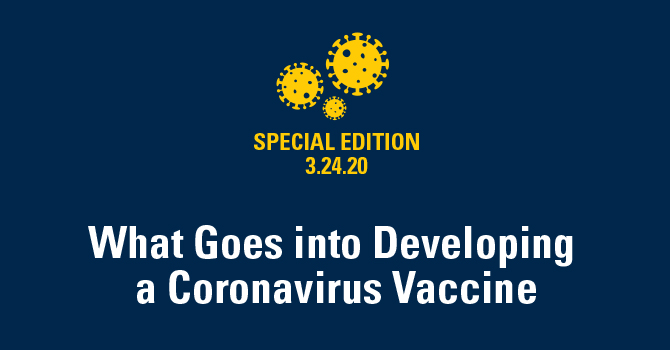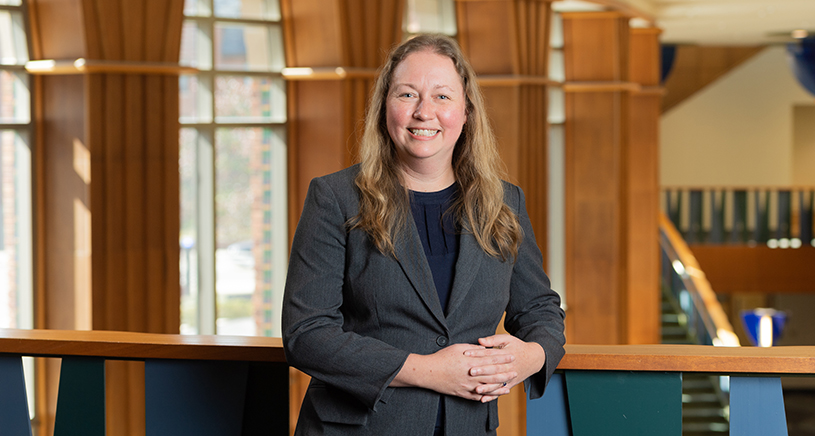What Goes into Developing a Coronavirus Vaccine

In recent days, theories about drugs that will supposedly help treat coronavirus have floated around the media. So-called treatments being debunked, lauded, and may even be putting people at risk. As the public holds out hope for a quick treatment, people are questioning - when are we going to have a vaccine for this disease? Epidemiologist, Emily Martin explains the process of creating a usable vaccine for coronavirus and why looking at the flu vaccine isn’t going to give us a head start.
Listen to "What Goes into Developing a Coronavirus Vaccine 3.24.20" on Spreaker.
|
Subscribe and listen to Population Healthy on Apple Podcasts, Spotify, Google Podcasts, iHeartRadio, YouTube or wherever you listen to podcasts! Be sure to follow us at @umichsph on Twitter, Instagram, and Facebook, so you can share your perspectives on the issues we discussed, learn more from Michigan Public Health experts, and share episodes of the podcast with your friends on social media. |
Speaker 1: The burning questions surrounding Coronavirus is “How do we stop it?”. As of this recording, there is no known medication to prevent or treat it. The only therapy that exists focuses on alleviating the symptoms like fever and cough. Meanwhile, there is a race on to create a vaccine to safeguard people. But what does that really take?
Hello and welcome to Population Healthy, a podcast from the University of Michigan School of Public Health. This episode is part of a series of special editions of our Podcast, focusing on the ongoing coronavirus pandemic.
Emily Martin is an Associate Professor of Epidemiology at the University of Michigan School of Public Health, and an expert in viral, respiratory illnesses. We talked with her about what it takes to create a vaccine and how long it will take to make a coronavirus vaccine available to the public.
Martin: If people want to pin their hopes on something that would fundamentally change the shape of the epidemic now, then put all your positive energy towards anti-virals and treatments. Because if an effective treatment is found now, that can be deployed instantly and will save lives. If an effective vaccine is found, there's still 12 to 18 months of testing, between now and us being able to use it, because we don't use vaccines unless they are proven to be safe and we don't use vaccines that we aren't confident will have a benefit.
The reason vaccines take so long to make is that not only do you have to figure out in the lab what you think is gonna work, you test it in animals, but then you test it in people both looking for safety and looking for durability and effectiveness of the vaccine and we call that efficacy. But what you're actually looking for is if you give the vaccine to somebody, are they protected for the necessary period of time to get them through the epidemic? The problem is, if you're gonna wait to find out the results of that test, you have to wait as long as you would expect somebody to need to be protected for. We want a vaccine that's gonna protect people for a couple of months. So at a minimum, it means that we need to wait until we've been able to test people and follow them for a couple of months. And so, that inevitably causes a delay in the vaccine being ready.
Speaker 1: Many people have likened this virus to the seasonal flu. Spurring hope that we may have a head start on finding a vaccine for coronavirus. Unfortunately, coronavirus is not that similar to the flu, but flu research may help us in other ways.
Martin: Coronaviruses and flu viruses, they're both RNA viruses, but they are a little bit apples and oranges. In terms of the way those viruses are structured means that they evolved differently. They use cells in different ways to cause infections. So unfortunately, there's not a lot that we can take from influenza itself to inform what we know about Coronavirus. But, all of the challenges that we've had with the influenza vaccine means that there's been an incredible investment in new and rapid vaccine development technology and some of those technologies are being deployed to make constructs that could potentially become Coronavirus vaccines. Because we've invested so much in trying to develop universal influenza vaccines, we now have better technology and just better science and hopefully that will make coronavirus vaccine searches go better.
Speaker 1: We do know that coronavirus began in animals and then infected humans. So another question in the quest for vaccine and treatment is “How worried should we be that this could happen again?”
Martin: There's interesting studies of people that live near bat caves. Those people have antibodies to all kinds of animal and bat viruses that leads us to believe that there is this kind of what we call chatter of exposure of animal viruses into humans that happens regularly. But for that to become even a small outbreak, it means it needs to cause an infection in that first human to the degree where that human then spreads it to another human, and then that human then spreads to another human, and that's what we call sustained human-to-human transmission.
We're pretty accustomed to the idea in the field of epidemiology that these spillover events actually happened all the time. That there are many, many, many, many individual animal viruses, that humans are exposed to that a single human might be intermittently infected by but they'll clear the infection and that infection won’t then go on to transmit from person to person to person.
And so the number of blocks that we have as humans to stop that from happening is pretty expansive. The human body is pretty good at shutting that process down. That's why the opportunity for this happens so often between animals and humans but that continued spread is not seen. It's only seemed very rarely.
Speaker 1: This has been a special edition of Population Healthy, a podcast from the University of Michigan School of Public Health. During the ongoing coronavirus pandemic, we’ll work to bring you analysis from our community of experts to help you understand what this public health crisis means for you. To stay up-to-date in between special edition episodes, be sure to check out our website publichealth.umich.edu, subscribe to our Population Healthy newsletter at publichealth.umich.edu/news/newsletter and follow us on Twitter, Instagram, and Facebook @umichsph.
In This Episode
 Emily Martin
Emily Martin
Associate Professor of Epidemiology at the University of Michigan School of Public Health
Emily Martin is an Associate Professor of Epidemiology at the University of Michigan School of Public Health. Her research focuses on respiratory virus epidemiology, hospital epidemiology, infection prevention, and molecular epidemiology. She also leads The Martin Lab, a team of researchers at the School of Public Health whose objectives include the use of molecular epidemiology to characterize the spread and persistence of viral infections and the evaluation of vaccination to reduce the burden of respiratory infections. Learn more.
